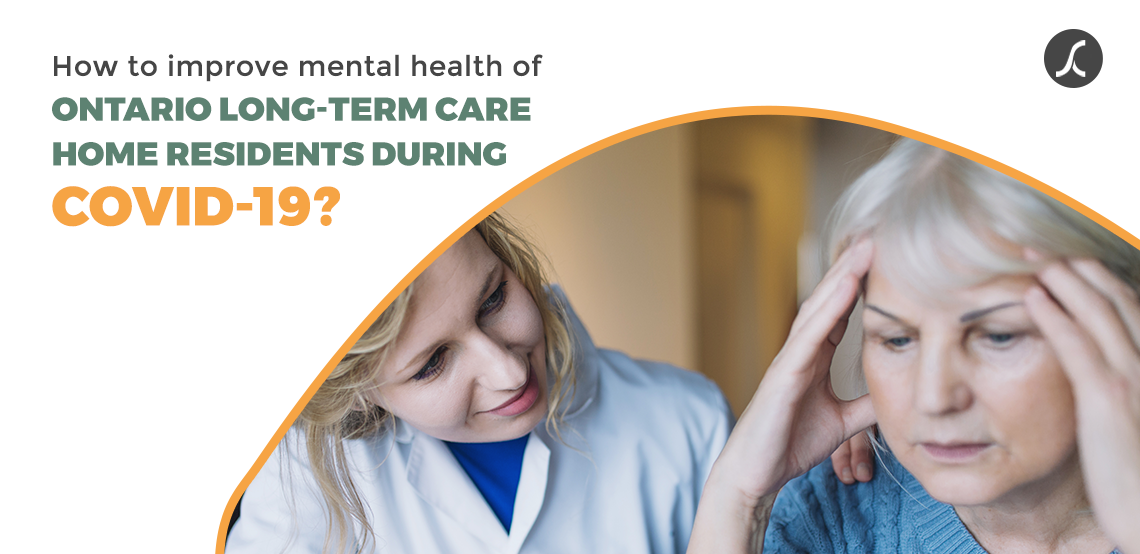How to improve mental health of Ontario long-term care home residents during COVID-19?

5 years ago
We thought it was just physical. We now say it is mental too!
The coronavirus seems not at all ready to spare us. When healthcare workers are working ceaselessly to save COVID-19 positives, many non-COVID-19 citizens are undergoing mental health issues.
However, those in LTC homes are even more at risk. Perceived social isolation and loneliness lead to several psychological symptoms such as depression and anxiety.
After the visit ban in Ontario LTC homes, family members of the residents cannot visit them which makes their mental health more awful.
LTC homes should now prepare to fight the war with coronavirus as well as with mental health issues of residents.
How are long-term care homes fighting with mental health issues of residents?
Many LTC homes have successfully found ways to ensure the good mental health of residents during the crisis.
- According to the news published in CBC, Sudbury's long-term care residents are able to talk to their family members and gather mental strength using video conferencing tools.
- Ottawa Public Health has created a Facebook group to keep residents and LTC homes up-to-date with information about healthy eating, active living and mental health.
- Many Ontario-based LTC homes including a Barrie-based LTC home are letting physicians talk to residents remotely which results in the improved mental health of residents.
A virtual care tool that enables residents to talk to their family members and physicians is the most affordable and fastest way to ensure the good mental health of residents during COVID-19.
However, it is worth mentioning that the virtual care tool requires many other resources to support virtual visits.
Here is the complete guide on how to improve the mental health of Ontario long-term care home residents during COVID-19.
How to improve the mental health of long-term care home residents during COVID-19?
To effectively improve the mental health of Ontario long-term care home residents, we have to dig deep and find out the reasons for the awful mental health of residents.There are major two reasons behind the poor mental state of residents.
- Social isolation
- Hypochondriasis (the fear of developing a disease)
If an LTC home can solve these challenges, the mental health of residents will automatically start improving.
The following are the top ways or resources required to solve two major challenges causing mental health issues in residents.
Solution: Deploy a PHIPA compliant virtual care tool
A virtual care tool actualizes virtual visits between residents and their family members. Because of such virtual visits, residents do not feel neglected and helpless during social isolation. This practice eventually improves their mental health.
In addition to this, a virtual care tool facilitates physicians who cannot visit LTC homes due to coronavirus, to offer remote care. After having a discussion with physicians, residents feel confident and thus, there are fewer chances to develop symptoms of Hypochondriasis.
The following are the resources you require to access the deployed virtual care tool.
⮞ Resource 1: Fast and uninterrupted Internet in LTC facility
The virtual care tools do not work offline. Meaning, fast and uninterrupted Internet connection is the most basic requirement.
To not shoulder additional burdens when LTC homes are already overwhelmed, it is a rational idea to hire IT experts to plan, design, configure and deploy network infrastructure and the network support team to solve network errors quickly.
Here, I would like to share a case study, showcasing how we set up IT infrastructure in an Ontario-based LTC home within 3 days, remotely.
⮞ Resource 2: Staff training to leverage virtual care tool with high-speed Internet
Elderly residents cannot navigate the virtual care tool themselves. So, staff training is needed to schedule virtual visits on behalf of residents with their family members or physicians.
⮞ Resource 3: Hardware support
Desktops, laptops, or tablets are the most fundamental requirement to carry out virtual visits. To reduce efforts and costs to focus more on resident care, Ontario LTC homes should outsource hardware support to experts. They ship, configure and maintain the hardware devices, professionally.
Easing the pain: Single source for all multi-vendor IT needs
For Ontario LTC homes, it is a waste of time and money to satisfy IT needs through different sources. Collaborating and communicating with different sources cause administrative pain and increase the chances of costly mistakes.
Here is where we play our role. We are a team of network engineers, hardware experts, developers, security experts, and software engineers.
My versatile team is able to satisfy all of your multi-vendor IT needs - from virtual care tool deployment to staff training, Internet setup, network support, and hardware support.
Due to COVID-19, we are providing our expertise to LTC homes remotely with a similar impact and enthusiasm.
Let’s schedule a virtual meeting to define the tech-enabled resident well-being strategy and implement it.

